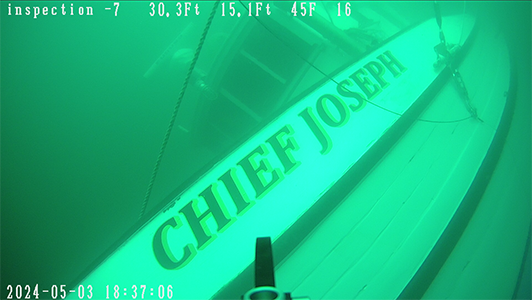||| FROM TOWN OF FRIDAY HARBOR |||
February 9, 2023
TO: Jon Cain Deputy Prosecuting Attorney 350 Court St. Friday Harbor, WA 98250 VIA EMAIL ONLY to jonc@sanjuancountywa.gov
RE: Appeal of Notice of Violation – 829 Argyle Ave. TPN 3513320010000; Meter 30643714
Dear Jon: As you know, the Notice of Violation issued to the County under FHMC Chapter 13.12 for unauthorized uses of Town water at the County Fairgrounds is not an appealable decision, but the Town agreed to allow the County to follow the appeal process set forth in FHMC Chapter 13.05 in order the give the County every opportunity to present its position. That process directs the Town Administrator to meet informally with the County within 10 business days of the County filing an appeal. You filed an appeal on January 19. You and I met along with the Mayor and Mark Tompkins on Friday, February 2, at 2:00 pm. Julie Greene attended to take notes.
At that meeting you provided me with 156 pages of documentation in support of the County’s position that all current uses of water at the fairgrounds, and indeed all future uses of water at the fairgrounds for any purpose whatsoever, either have been tacitly authorized by the Friday Harbor Town Council, or, in the alternative, do not require authorization by the Friday Harbor Town Council, and your water use is limited only by the capacity of the 2” water meter to the property. You argue that by agreeing to install a water connection to the fairgrounds, the Town Council relinquished all authority over water service to that location, so long as the County pays for the water it uses.
I have carefully pored over all the documents you provided me last Friday afternoon, with an eye to viewing them in the light most favorable to the County. I was unable to find anything in those documents to support your position. In fact, the “San Juan County Fair History 1921-1975” you provided (hereafter “Fair History”) bolsters the Town’s understanding that the only authorized use of water at the fairgrounds is to support the County Fair.
The Town owns and operates a municipal water system for the benefit of the residents and businesses of Friday Harbor. The Town cannot be compelled to serve properties outside the town limits any more than the Town can compel property owners outside the town to connect to our system. However, the Town may voluntarily agree to provide water to customers outside the town limits, which is presumably how water service to the fairgrounds came to be.
The Fair History document you provided indicates that possibly as early as 1948, the Town agreed to extend its municipal water system to the fairgrounds’ current location. The Fair had been held at that location for the previous 24 years without town water. Further, this document indicates that from 1924-1975 the need for water at the fairgrounds was exclusively to support the annual County Fair: a flush toilet was installed for the 1948 fair; in 1956 it was noted that water was needed in the sheep barn. Virtually all buildings constructed during this period were to support the annual Fair event: stock buildings, an exhibition hall, the Pioneer log cabin, a livestock building, a new barn, a 4-H building, another new barn, another stock barn, a grandstand, a caretaker’s trailer, restrooms near the grandstand, a BBQ pit, a new horse barn, a Home Ec. Building, and an Arts and Crafts building are all mentioned. While there may have been incidental use of the fairgrounds during these years, likely none of these uses required water, and the essential purpose of the fairgrounds was to hold the annual County Fair.
The Fair History document covers the period from the Fair’s beginnings through 1975, the year before the drought that resulted in the Town, in 1979, prohibiting any new water connections outside the town, and restricting existing customers located outside the Town to the uses approved at that time. The Fair History document supports the Town’s contention that as of 1979, water use at the fairgrounds was in connection with the annual County Fair, and the Town’s willingness to continue providing water to the fairgrounds was to support that important community event.
Over the years, various persons acting on behalf of the County seemingly have not understood that Town water and sewer utilities are not available “on demand” to properties outside the town limits, even properties owned by the County. Note the September 1992 CUP Fair Board application that states, “The [new Main Exhibition Hall] will be served by sewer service.” It wasn’t until several weeks later that the Fair Board asked the Town Council if they would consider providing sewer service to the fairgrounds, and for many reasons the Town Council voted no. Likewise, according to County Building Official Dennis Neal in his November 12, 1992, review of the Fair Board’s CUP application, the Fair Board indicated on its site plan that “a new 3” water line will be laid in along the north end of the multi-purpose building,” but again the Fair Board had not asked the Town Council if they were willing to provide this additional water service, and ultimately the Town again said no. This confusion continues to this day, with two current Fair Board members contacting me to discuss what they were hearing for the first time: that water use at the fairgrounds is restricted. Neither of them understood the implications of the fairgrounds being outside the town limits. Compare the letter you provided from Jeff Otis, Senior County Planner, to Lloyd Miller dated June 10, 1993, stating that the proposed construction of a Senior Services Building at the fairgrounds would require demonstrating they could provide adequate water service. Jeff Otis understood that the fairgrounds, although served by Town water, did not have unbridled use of its water.
The Town has consistently held that water use at the fairgrounds is restricted, and there are emails and news articles I have already provided you that demonstrate the Town’s frustration over the past 30 years with the County’s continued lack of acknowledgment of these limitations:
“At the end of the day I had a meeting with Mike Thomas about the water issue at the fairgrounds. He was not aware of the restrictions and I am glad I caught him now because I think the county has a plan for building a park building on the site and I told him that wouldn’t be happening without authorization from the town. I had made several inquiries about their records on how they can use water and they’re [sic] slow use expansion over the years and that we needed to make a plan for how to control this in the future.” Email from Duncan Wilson to Mayor Lacher, July 30, 2013
The rationale behind the Town restricting water uses by nonresidents is two-fold: to be able to plan for needed capacity for our water system, which we cannot do if we are compelled to provide water to properties where we have no authority over the kind of development that occurs there, and to protect our tax base. The Town of Friday Harbor does not want our water system to be used to support commercial development outside the Town that competes with Town businesses while providing no tax revenue to the Town. This is why, for example, although a vacation rental might use less water than a residence, the Town does not allow customers outside the Town to hold a vacation rental permit; vacation rentals in the County compete with Town overnight accommodations, and generate no sales tax or lodging tax for the Town; all those taxes go to the County.
Finally, I will address briefly two arguments made toward the end of the February 2 meeting:
- Mark Tomkins argued that because the Town provided the fairgrounds with a 2” water meter and service line, the Town must have anticipated the County would engage in significant development of the property, since a 2” line can serve a large number of fixtures. He argued the installation of a 2” meter and service line was tacit approval of any and all development at the fairgrounds that can be served by a 2” line. This is simply wrong. The 2” water meter and service line were installed in order to provide sufficient flow from Argyle Avenue to the back of the fairgrounds where the livestock barns are located, a distance of nearly 700’.
- Either you or Mark Tompkins argued Mike Betrand’s lack of a response to Annie Matsumoto-Grah’s email dated November 14, 2014, must have meant the Town Council approved providing water for government offices at the fairgrounds. Adding government offices to the fairgrounds violates the GMA and our Joint Planning Policies. As a matter of public policy, staff cannot agree to violate the GMA or our joint policies. Moreover, the water restrictions at the fairgrounds are in place by ordinance, and staff do not have the authority to amend Town ordinances. A non-response by the Town on any matter should not be considered approval of your intended actions. Further, while town staff has the right to review development at the fairgrounds per our Joint Planning Policies, the County is free to ignore our concerns, as it did in approving the 1992 CUP for the fairgrounds notwithstanding our concerns regarding stormwater, parking, water, sewer, fire flow, impacts to the surrounding neighborhood, and requesting a SEPA Determination of Mitigated Nonsignificance rather than the County’s SEPA Determination of Nonsignificance. Your own Building Official shared similar concerns regarding compliance of structures with building codes, emergency access, fire suppression, barrier-free access, water availability, sewage disposal, parking needs, RV camping, grading, noise, and handling of combustible and flammable materials. This can all be found in the documents you provided me.
The Town has always supported the County Fair and wants to see it continue and thrive. (In fact, most of our Water Department staff believe the Town donated the water connection to the fairgrounds. That 2” water connection today would cost more than $115,000.) Likewise, the Town wants to be a helpful partner to the County in its efforts to keep the fairgrounds operating. We understand it is an important community amenity that benefits Town residents as well as the residents of greater San Juan Island. In that regard, we see several options that are a win-win for both the Town and the County, allowing the County to continue using the fairgrounds for community events while allowing the Town to protect our water capacity and keep our businesses competing on a level playing field. The County could:
- 1. Request that the fairgrounds be annexed into the Town. This would allow the Town to plan for water needs at this location, alleviate any concerns that commercial activity there unfairly competes with other businesses operating inside the Town, and resolve any issues regarding lost revenue for the Town. It is not uncommon for fairgrounds to be located inside municipal limits. The Northwest Washington Fair and Event Center is located in the city of Lynden. Annexation has been discussed at various times over the years. The most recent discussion I can find was during the joint meeting on September 12, 2001, where the Town Council and the County Commission discussed annexing the fairgrounds: “Both [County] Commissioner Evans and Miller indicated that year round use of the Fairgrounds is an idea being considered. [Town] Councilmember Brooks inquired if the County was willing to pay infrastructure improvement costs to upgrade the wastewater main line to accommodate the Fairgrounds. [County] Commissioner Evans expressed that the County would be responsible for any infrastructure improvements involved with the Town’s accepting the Fairgrounds septage. Mayor Boothman clarified not only the wastewater main line would need an upgrade, but the septage generated by the Fairgrounds would impact the flows at the Wastewater Treatment Plan and may cause a shortened life span for the new Wastewater Treatment Plant. … [Town] Councilmember Sheiman advocated putting the Fairgrounds in the urban growth area for future Town annexation. [County] Commissioner Miller expressed concern regarding public health issues. … Following discussion it was decided that the Town would create a cost analysis for infrastructure, etc., to hook up the County to the Town’s wastewater system and that the County would attain [sic] figures in relation to the amount of septage generated by the Fairgrounds.” Annexation and connection to town sewer would also alleviate any concerns about the capacity to safely treat septage at the fairgrounds as that property sees more year round use.
- Remain outside the Town, but continue to use town water during the County Fair. The fairgrounds could be served by portables for events during other times of the year. The Pig War Picnic, which draws hundreds, perhaps thousands of visitors each year during the busy 4th of July holiday, has for years been held at the Historical Museum using portable toilets and handwashing stations. And the Childrens Playground and Skate Park located at the fairgrounds relies on a portable year round. Some of your facilities provide no restroom facilities at all, like Zylstra Lake. Yet all these facilities are widely used and loved by our residents.
- Drill a well and disconnect from Town water. The exempt well provisions in Washington allow you to draw up to 5,000 gallons per day, which would provide more than sufficient water for the fairgrounds to operate year round.
Accordingly, I am upholding Ryan Ericson’s Notice of Violation issued January 9, 2024. Should you choose to appeal this decision to the Town Council, you have ten calendar days to file with the Town Clerk a request for the Mayor to place your appeal on the Council’s next regularly scheduled meeting agenda, or on a meeting agenda as soon thereafter as practicable. The deadline for requesting an appeal is February 19. As I offered previously, we will not take action to turn off water to the fairgrounds until you have exhausted the appeal process.
Whether you appeal this decision or not, the Town remains willing to work with the County on any of the three options mentioned above, or on any option you might be considering where the Town could be a partner. Further, the County always has the option to come to the Town Council to request additional use of water at the fairgrounds, as you last did in 1993 when requesting water for fire suppression, which request was granted.
Regards,
Denice Kulseth Town Administrator
cc: Raymont Jackson, Mayor Town Council
Amy Taylor, Town Clerk
Ryan Ericson, Community Development Director Jesse Douglas-Seitz, Public Works Director
Kasey Anderson, Water Distribution Supervisor County Council
Mark Tompkins, Interim County Manager
Brandon Andrews, Parks and Fair Director and Asst. Interim County Manager








I mean clearly this is more of a San Juan Island issue than an Orcas one, but the thing I don’t understand here is what is the actual issue from the Town? Are they running out of water? Is the County not paying their water bill?
Clearly the Fairgrounds is a vital community resource that shouldn’t just sit unused 361 days a year.
This sounds a lot like a petty squabble cooked up by a petty Town of Friday Harbor bureaucrat or two to poke their big brother. My guess is that this can be traced to some perceived slight or miscommunication or personality dispute. My advice would be that Friday Harbor Mayor and Manager ask themselves if this sort of thing is really the best way for them to be benefitting the taxpayers they work for.
What a joke
For anyone who wants to get a first hand glimpse of the dysfunction at the town of Friday Harbor, take a look at the video from the March 7 Council meeting (link below)
Meeting begins with reasonable citizens highlighting the Town’s stance to stand in the way of affordable house, but skip to the 24th minute for the good stuff. First a town employee berates members of the public, then Mayor and a Council member get into a literal screaming match as they trade insults. Talk about must see TV, what an embarrassment and a clear sign of why communities suffer when local officials lead with their egos (something Orcas knows a thing or two about).
http://fridayharbor.org/2202/Agenda-Meeting-Info-Video
For what its worth, here’s my two cents on the Town vs County Fairgrounds water dispute. The in-council arguing is one thing, but the water issue is the more important consideration..
Concern over island water capacity is real. We all know this. The Town of Friday Harbor has a legal and fiscal responsibility to provide water to those who pay Town taxes to maintain its water system now and into the future. We all love the Fairgrounds and the Fair, but that doesn’t mean that the Town can gift critical resources to the county, or jeopardize the availability of those resources in the future.
I developed extensive gardens on my property on San Juan Island, in doing so I had to carefully manage the water used to irrigate so as not to run our well dry. The Town is no different in terms of its reservoir, especially as we face climate change and eventual population growth. The Town has identified possible solutions; the County needs to choose one and move on.
Lastly, I find it ironic that during this current debate, no one is remembering that for years now, the County has determined that the Fairgrounds must be financially self-sufficient, something not possible without generating revenue beyond Fair week. In my mind this has been a threat to the future of the Fair itself, for previous County Councils have been reluctant to dedicate more of the County budget to support the maintenance of the event and grounds. “Where will the money come from?” was always the reason. Hence, a horse barn was not constructed to replace the old one, so now annual big-top tent rentals are used for this purpose. To be self-sufficient, year-round uses (both nonprofit and commercial,) and likely more development will be necessary going forward. Assuming this is true, will more income-generating infrastructure eventually squeeze out areas necessary for the traditional Fair activities that we’ve come to enjoy?
Either way, somebody needs to pay for maintenance and new development, all of which will require more resources, including water. The Town Council and Town taxpayers are justified in thinking that they shouldn’t be expected to carry this burden alone.